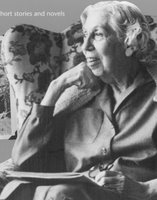
Having lived near the capital city of Jackson, Mississippi, I had the privilege of enountering Miss Eudora Welty on several occasions: sitting behind her at local plays; spotting her at a muffler shop patiently waiting for a ride; dining near her table in a local restaurant; browsing books in a popular bookstore; or shopping for groceries at then-famous Jitney 14, to name a few. Stories passed around in readers' circles of where they had encountered this author at the most unexpected moments. She led her life as any other Jacksonian--with no pretensions.
There had always been an unwritten rule among book lovers that one didn't call Miss Eudora on the telephone or stop her on the street to engage her in conversation, unless you were a good friend. A brief greeting to this lovely person was as far as anyone dared.
Once, I was searching in a new bookstore for a copy of her biography to gift my dad. The store was gaining a reputation for stocking Mississippi authors (of which there are many). As I thumbed through several editions, I heard her familiar deep, Southern drawl.
Turning my head in that direction to confirm my suspicions, I saw her standing several feet away. How to speak to her and not feel flustered? I picked my selection, all the while trying to think up something appropriate. I proceeded to the cashier, arriving at the same time as she. Flustered to think she would consider this move planned, my speech faltered as I said to her, "Wha-what a nice surprise to see you here. I'm giving my dad a copy of One Writer's Beginnings for his birthday." She smiled, a brief moment passed, and then she said, "Well, would you like for me to autograph it for your father?" She did.
As a teacher of senior English during the mid 70's, I discovered the students had never read any of the classics, so their book reports centered on authors I knew were important to prepare them for college English. The school library had very few copies of the books I required, so off to the second-hand bookstores in several towns. Also with help from friends and a raid of my personal collection, there were enough paperbacks to pass around.
During that year Miss Eudora was presented an award from the French Embassy at our capitol building on a schoolday. Students from the three classes loaded into cars and headed for the ceremony. She appeared before the crowd, a tiny figure, while the ambassador reminded us the reason this author was so popular in France: her description of people and places in a rural setting appeared familiar to that of the French countryside. French readers loved her stories. The students discovered this famous-under-their-noses author quiet and unassuming, not at all fitting the looking-like-an-author mold they had created in their minds.
The next year the Jackson library expanded into a new building and was named the Eudora Welty Library. A grand presentation and reception was held. The next year's students were invited to this event. Introduced by another author and a dear friend, Jim Lehrer, the lady of the hour, to the students' surprise, was surrounded by dignitaries from Washington, New York, and Europe. Still, the fact that they were in dignified company failed to capture their interest.
Miss Eudora died in 2001 at the age of 92. She had won the Pulitzer Prize in 1973. I hope a few of my students, now adults leading their own lives, stopped for a moment to remember her. Maybe by then they even had read some of her stories.
A few years later when our daughter graduated from Leslie College, Cambridge, MA, the family celebrated the event by attending. The next evening we went to a local club to hear a band popular with our kids. As usual, the young people had to present their identification at the door. When I got to the front of the line, I blithely asked, "Do I need to show you mine?" hoping he'd think I was younger than I looked. A joke, really. But not to our kids. Mom had outdone herself in embarrassing them.
Several hours later my husband and I left the group and headed towards the door. The ID checker to whom I'd spoken upon entering, walked up to us and said, "Did I hear from your voice that you're from the South?" We said yes, and he began peppering us with questions about his two favorite authors, William Faulkner and Eudora Welty. "Well," I reminded him, "I can tell you a bit about Faulkner, and a whole lot about Welty." For the next two freezing hours or so outside the club I related everything I ever knew about both of them, his mind cataloging the facts. He told us he had majored in literature in college, had traveled around the world, but had never visited the towns where these famous authors lived.
His next question was, "Now, is Mississippi near Texas?" I smirked and said, sort of and gave him the general locations of the home towns, Oxford and Jackson. Finally, the February cold of this eastern city became unbearable to remain outside, and we bade goodby to our avid listener. His parting words were "I'm going to Oxford and Jackson on my next vacation." I felt warmed that I had entertained the mind of a stranger with my Welty/Faulkner knowledge.
Miss Eudora left her home and its furnishings to the state of Mississippi in 1986 while she was still living there. This weekend for two days visitors will be able to see this National Historic Landmark where her parents instilled in her a life-long interest in reading. It is a literary house, not a museum, fully furnished just as Miss Eudora left it. I'm going to be first in line Saturday morning.


